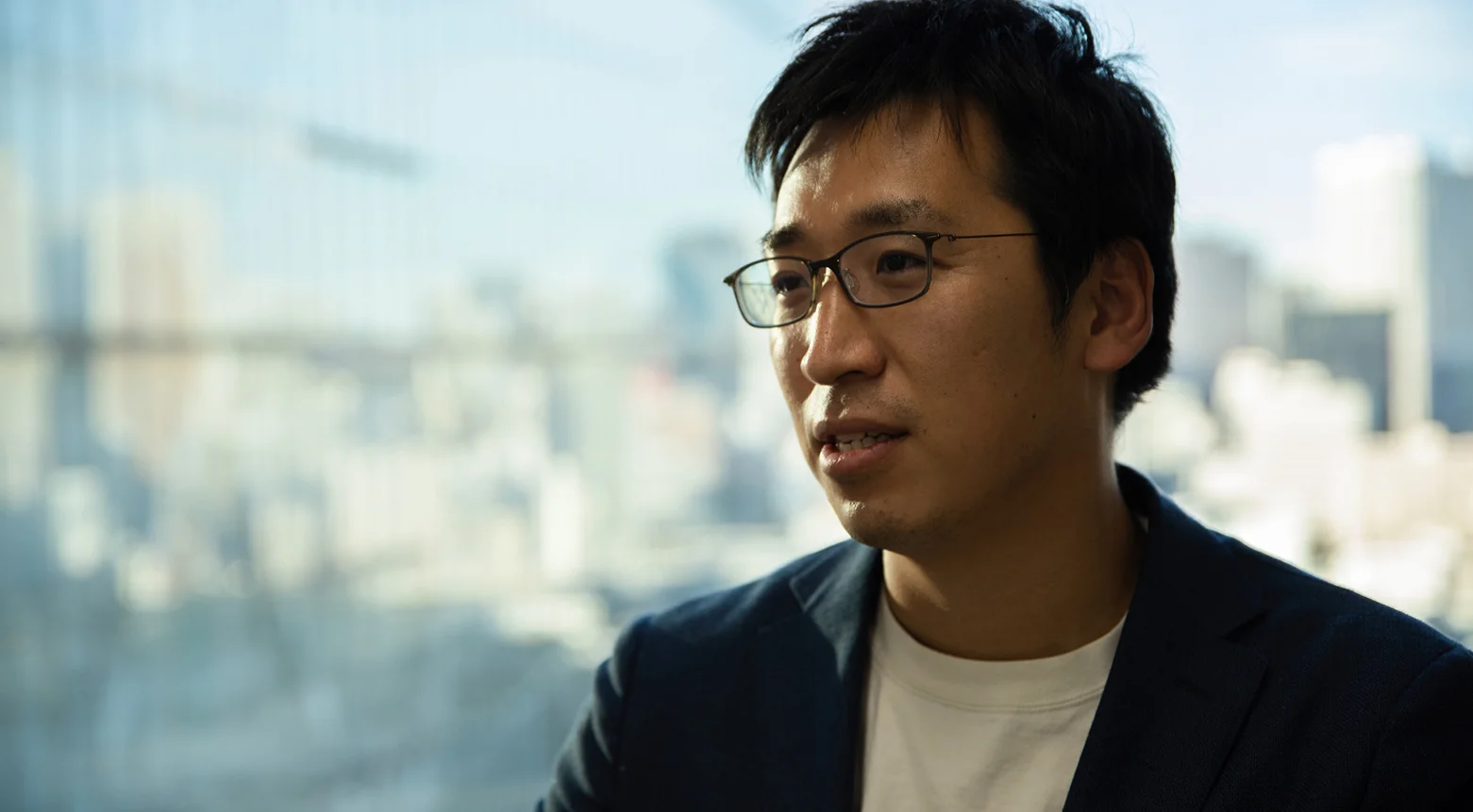Did you find this article helpful for what you want to achieve, learn, or to expand your possibilities? Share your feelings with our editorial team.


Oct 2, 2021
CAREER & LIFEThe convictions of an intellectual property expert
Changing the state of intellectual property in Japan: proactively contributing to business and societal advancement
-

Intellectual Property Div.Shun Sakata
During his university years, Sakata studied nickel-hydrogen batteries while also attending law school to learn about intellectual property law. After working for a time in the intellectual property division at a major electrical machinery manufacturer, he joined DENSO in 2020. Today, he leverages that experience in intellectual property and litigation to solve communication-technology patent disputes in the auto industry.
Shun Sakata is an intellectual property expert who tackles patent problems in the auto industry. Using the experience and knowledge gained while working at a major electrical machinery manufacturer, he now assists patent holders and is helping to solve issues in the automobile supply chain based on a proactive—even combative—approach to protecting technology-related intellectual property rights. We asked him to explain what motivates him to continue this battle, and what makes the job worthwhile.
Contents of this article
An encounter with IP at university led deeper into a highly specialized world

I find intellectual property—or IP for short—truly fascinating. It’s been 14 years since I began my IP-centered career fresh out of college, yet my interest in the subject remains just as strong.
In simple terms, working with IP means protecting the technologies and inventions of one’s own company. In order to secure patents, trademarks or similar, one has to study relevant laws, investigate trends at other companies, and apply for patents. Many think of this as bland, soulless work, but going on the offensive is a significant part of what I do.
A rights infringement, for example, can sometimes lead to a lawsuit. One must build a strong framework in order to win such legal battles, which requires a combative stance. Going on the attack in this manner, as well as other aspects of my work, requires wide-ranging skills, which makes it very rewarding for me.
I first became interested in IP at university. At the time, I was studying applied chemistry in the school’s engineering department. After earning too many credits during my first year, I found my schedule relatively empty during the second, so I used that time to begin studying for the national bar exam to become a patent lawyer.
A patent lawyer is a specialist in the IP field, and there were two reasons I wanted to pass the bar exam: to become an expert in some specific field, and to increase my market value by acquiring the various skills required of a patent lawyer, which include technical knowledge, legal knowledge and English language. Law is a highly specialized field, and thus seemed to suit me well. Also, the prime minister at that time was striving to make Japan more IP-driven, and this stoked my interest in the subject. The more time I spent at the law school where I was studying for the bar, the more fascinated I became with IP and I began thinking about using that knowledge in my career after graduation.
Pressure and teamwork at the front line of an intense IP lawsuit

After finishing university, I went to work at a major electrical machinery manufacturer. I had been searching for an employer with an open position in the IP department, and fortunately I was hired. The job was appealing because it gave me the opportunity to engage in a wide range of IP-related work from a young age. After getting the position, I became involved in submitting patents for lithium-ion batteries, negotiating with other companies on IP matters, and other such work. It was very rewarding, but then the company’s IP operations were sold off about five years after I joined, leaving me with no way to remain in the IP field. This was the lowest point of my career.
Right around that time, I was transferred to a department that handled litigation, where I started out with small-scale lawsuits. However, I was interested in taking on bigger things, and after talking to my supervisor, he put me in charge of a huge lawsuit that happened to be underway.
During this project, I experienced fierce legal battles firsthand: another company from the same industry was suing us for patent infringement, and as a counterstrike we filed a separate suit against them. Our efforts were split between two teams: a defensive team, which was tasked with fighting the opponent’s suit against us, and an offensive team, which was in charge of taking legal counteraction against the other party. I was assigned to the offensive team. We lost our defensive battle and were forced to stop selling the product in question. Therefore, if our offensive measures also ended in defeat, it would severely affect our company and threaten future operations.
This was more pressure and responsibility than I had ever experienced, and it was a constant battle to defeat the opponent. We were given great discretion in order to win, and we discussed and implemented our strategy together as a team. Despite the frustrating experience, working together as a unified team of talented members, all of whom trusted each other, turned out to be really enjoyable.
Our lawsuit took three years to complete, and in the end we won. The whole experience made a deep impression on me—in part, of course, because we won the suit—and all of us still meet up for drinks sometimes and reminisce on that fun experience.
Breaking fresh ground: tackling emerging auto-industry patent issues at DENSO

After that big lawsuit, I went back to the patent submissions department, but it didn’t feel like I was contributing as much as when I was fighting in court. Motivated by a desire to test my skills in a new work environment, I made a mid-career job change in 2020 and joined DENSO Corporation.
In recent years, IT technologies are increasingly being integrated into automobiles, and cars can now communicate with outside devices and systems. These, in turn, have led to new auto-industry technologies and innovations such as mobility as a service (MaaS) and automated driving. Communication technologies have proven vital for such industry progress, which has led to intense activity in patent-related operations.
Though it may sound like “technobabble,” let me explain: The technologies which enable cars to communicate with outside systems are based on specific standards, and standard-essential patent, or SEP, licenses must be applied for and acquired in order to use those standards. Disputes regarding these licenses, which can lead to lawsuits, often occur between SEP holders all around the world.
Similar disputes were once commonplace in the smartphone industry as well, but in the auto industry, the disputes are much more complicated in nature. One of the reasons for this complexity is the differing business practices between industries: in the case of smartphone SEPs, everything took place within the telecommunications industry, and typically the producer of the finished product acquired all required licenses together at once. All SEP holders were part of the same telecommunications industry, and so they knew each other’s business practices.
In contrast, in the auto industry, it’s common for each of the individual suppliers of the various components to secure licenses in advance before delivering the components to the manufacturer who assembles and completes the vehicles. Therefore, from the perspective of the SEP holder, license-issuance requests are coming from multiple, unexpected sources, which is the result of the auto industry’s established approach, and problems often arise due to these differences in practices. This, in turn, makes auto-industry SEP disputes that much more complex.
The results of patent disputes have major impacts on the future of companies in the auto industry, and I decided to work for DENSO to help solve such problems. I knew that the company possessed a lot of different communication technologies, and I had also heard that, as an automotive parts supplier, they often work with patent holders. This was one of the reasons I chose DENSO.
Currently, I work for a team in the Intellectual Property Div. tasked with resolving patent-related problems. There is no single, correct answer to the many problems we encounter, so I always keep my eyes and ears open for new knowledge, consult with other divisions and departments, and continually search for new solutions through my day-to-day work. Because patent-related disputes have major impacts on management strategy, I also work in close coordination with company executives.
These are issues that transcend individual legal battles with patent holders; they are extremely challenging issues that affect the automobile supply chain as a whole. Every industry player is constantly looking to see which company did what, and which legal decisions were reached in relevant suits. It’s no exaggeration to say that disparities in knowledge can determine a company’s future, so we try to stay on top of things and make sure we know more than the competition. I sometimes get fed up and feel like giving up, but if our team goes down then so does the company, so we stick with it and keep fighting.
Contributing to society through IP and continuing to take on challenges for the future of the auto industry

To protect one’s IP is to protect one’s technologies, and that protects the people who developed them, as well as the lifestyles and livelihoods of all people involved with them. In short, IP work is not just for the sake of profit by one’s own company alone; it is also for the sake of the entire industry and wider society.
At my previous job, the director in charge of IP operations often told me, “You can quit your job at this company anytime if you feel it’s necessary to help raise the standards of IP for Japan as a whole. I want you to contribute in as many different ways and places as possible.” Many people I used to work with followed this advice, finding jobs that enable them to contribute in a wide array of industries, just as I decided to work for DENSO.
The Intellectual Property Div. attracts people from careers in different industries based on a passion for and sense of mission in the IP field. Working together, we are driven by a desire to transform the state of IP in Japan.
There are a number of big challenges in my work with auto-industry patent issues, and it will probably take time before I can make a meaningful contribution to society. However, I believe there is no problem that cannot be solved, so for the sake of a better future for the auto industry and all the people involved, I intend to maintain my proactive, attacking approach as I take on new challenges moving forward.
【Afterword】
Shun Sakata has devoted his life to intellectual property based on a strong sense of duty. Although he was not proactive when he finished university and entered the real world, he has become much more confident through challenges and hard work over the years.
While committed to his work, Mr. Sakata also values his personal time. He makes sure to get plenty of exercise, going to the gym regularly and cycling to work every day, to keep himself mentally strong. And when he returns home after work, he always prioritizes time with his wife and three children.
By keeping both his body and mind fit and healthy, Shun Sakata is able to continue his IP work.
COMMENT
Changing your "Cant's" into "Cans"
Where Knowledge and People Gather.



